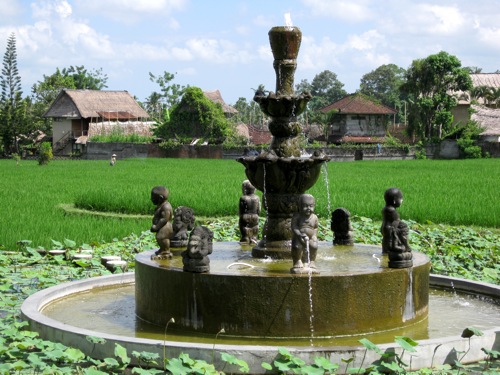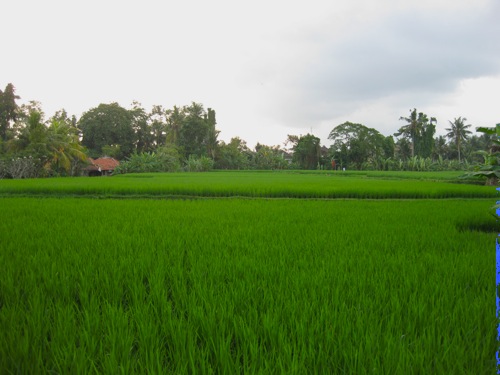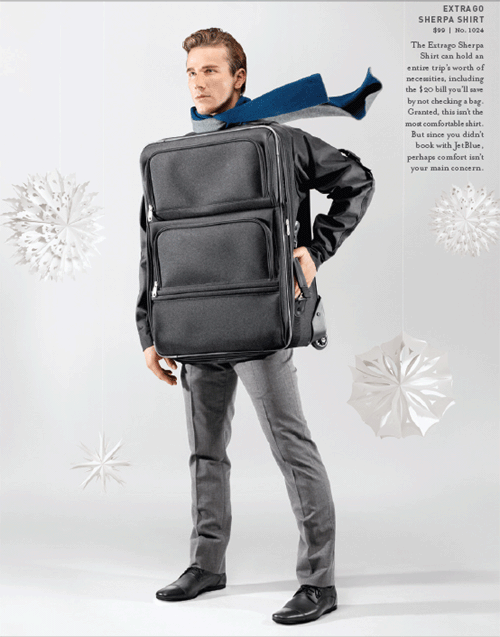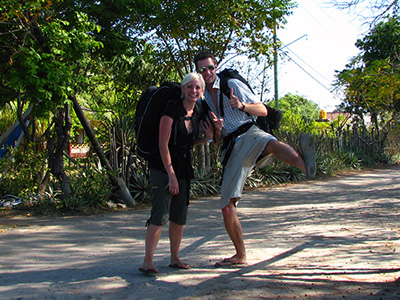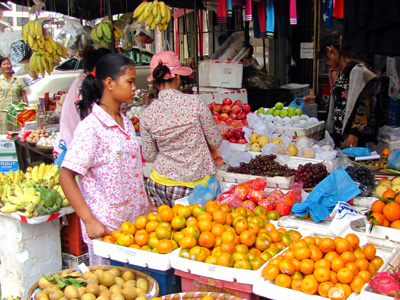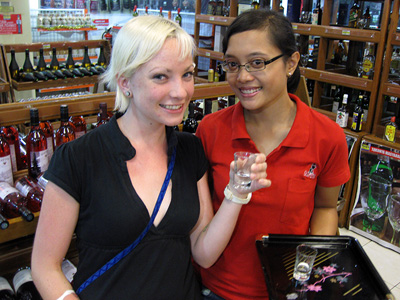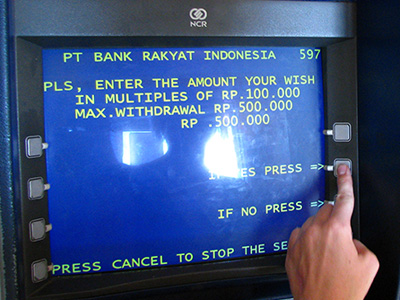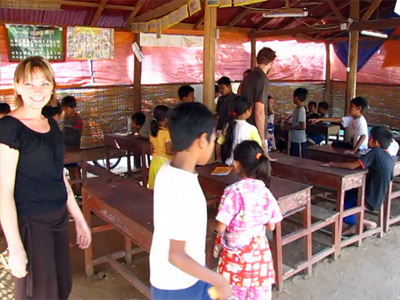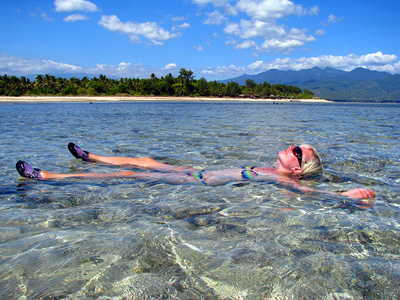Posts Tagged ‘flying’
Cheap travel tips: A guide for backpackers on the smallest budgets
Posted in Travel Tips on April 2nd, 2010 by Vagablonding – 23 Comments“Do you have a trust fund or something?!”
When people hear about how much I travel, a question like that is usually their first response. Most people think of travel as this Really Expensive Thing that they Could Never Afford. In reality, you can travel the world for far less money than you live on at home. If you’re really good at budgeting and you’re dedicated to traveling on as little money as possible, you can see the world on less than $400 USD a month. Seriously!
Start at home.
Traveling on a super small budget starts before you leave home. Cutting your expenses lets you save more money. The more money you have, the longer you can travel! Get rid of your car and use public transportation, or a bike, or your feet, to get around. Move in with roommates, or your mom (yes, I did this), to save money on rent and utility bills. Get rid of your cell phone, or at least switch to a cheaper plan. In fact, get rid of any frivolous monthly bills like cable TV, gym memberships, student loans (defer them!), etc.
Completely stop all unnecessary spending. This means no going to restaurants, bars, concerts, etc. Sure, you may really want to see Lady Gaga flounce around on stage, but the $70 you save by NOT buying that ticket will get you over 3 weeks of accommodation in Southeast Asia! And that $8 you were going to spend on a movie? That’s 3+ days worth of food on the road.
You know where your money is going; examine your expenses and decide what you can live without. Keep in mind that you’re giving up some creature comforts because your money is going to get you experiences that are much more valuable than the ability to TiVo your favorite show. If you don’t know where you money is going, you need to find out. Mint is an excellent free service that keeps track of all your bank accounts and lets you see exactly what you’re spending your money on.
Choose your destination wisely.
You can travel cheap anywhere, but your money is going to go waaaay further in Southeast Asia and India than it is in Europe or the United States. Research how much you can expect to pay for food, accommodation, and transportation before you pick your destination. Don’t forget to factor in airfare, though! You might be able to travel in a country on the other side of the world for a few dollars a day, but getting there could cost you a fortune. However, if you’re planning on staying in that region for a long time, the total cost will likely average out to less than you’d be spending in a closer-to-home but more expensive place. Plus, going somewhere exotic and far away is almost always worth the expensive plane ticket.
Planes, trains, and automobiles.
The plane ticket has always been by far the most expensive part of every trip I’ve gone on. Unfortunately, if you want to go to the other side of the world and you’re not a strong swimmer, it’s a necessary evil. Ruthlessly searching and re-searching on cheap flight aggregator sites, like Kayak and BT-Store which search for flights on both individual airlines and sites like Expedia and CheapTickets all at once, is the best way to find the cheapest flights. [Kayak tip: you can search up to 4 departure cities and 4 arrival cities at a time!] Once you find a flight you are happy with, you should go to FatWallet, a site with tons of coupons and other money-saving deals, and see if they offer cash-back for the site you’re buying the ticket from. If the site is Orbitz, for example, you can get 4.2% cash-back if you just click the FatWallet link to Orbitz. That’s $42 cash-back on a $1000 flight!
Once you’re in the region you want to travel in, stop flying from point A to point B. Taking the train is almost always cheaper, but the cheapest option by far is using the same transportation the locals use. Many of the countries on the backpacker trail are pretty poor, so getting around local-style is usually dirt cheap. Never take a taxi if you can avoid it. However, if you’re traveling in a dangerous area late at night, especially if you’re a solo female traveler, don’t recklessly ignore your personal safety just to save a few extra dollars.
Finally, the best way to save on transport when traveling is to move around less. Instead of jetting from place to place, try staying in a town you like for 2 weeks, 3 weeks, 4 months, whatever. I find this kind of go-and-stay-a-while travel to be a lot more rewarding than trying to see as much as you can in as little time as possible. Posting up for an extended amount of time gives you the opportunity to really get to know a place. You get to make lasting friendships, really learn about the culture, and maybe even make a difference in the lives of the locals by volunteering your time.
A place to stay.
The absolute least you can expect to spend on accommodation per day is… nothing! With sites like CouchSurfing and HospitalityClub you can find people all over the world who are willing to let you stay with them for free. This is an excellent way to make new friends and to see a town from a local’s point of view. These sites have gotten really popular and their communities are very involved. Hosts are publicly rated and commented on by guests, and you are encouraged to speak with your host on the phone or meet them in person before staying with them. Sleeping on a stranger’s couch might sound dangerous, but horror stories are incredibly rare and many people say they feel safer couchsurfing than staying in hostels.
If you’re not comfortable with couchsurfing there are always super cheap dorm beds to be found in hostels and guesthouses. These can go for as cheap as $2 a day. If you’re going to a country with nice weather you can always consider bringing your own tent and camping. Other pretty awesome cheap options that I’ve seen in regions like Central America where the tropical weather keeps temperatures comfortable at night, are places that let you rent a hammock or hang your own hammock. Often this only costs a couple bucks a night. Plus you get to sleep in a hammock! Yet another option is sharing accommodation with your travel buds. A $12 double room gets a lot cheaper when you squeeze 5 people into it, and it might even come with the benefit of a hot shower!
Filling your belly.
Just like at home, chowing down at restaurants and going out for drinks seriously eats into your travel cash. Once again, the cheapest and most money conscious option is to do what the locals do: buy food from the market and eat from food stalls or carts. There was one day when I was in Cambodia where I ate nothing but peanuts and those tiny bananas all day, and let me tell you, it was delicious! I spent less than $1 on food that day. Eating what the locals eat gets you the added benefit of experimenting with the local fare, which I have found is really tasty more often than not. This is probably because the ingredients are fresh and there aren’t a bunch of added chemicals and preservatives you can’t even begin to pronounce like we have in our food at home. Not only are you saving money, but you’re probably also eating healthier, what’s not to like? If you’re lucky enough to have kitchen access in the place you’re staying you can save serious dollars buy buying cheap ingredients from the local market and cooking your own food. Lots of hostels have communal kitchens, and your couchsurfing host will probably let you use theirs, too, especially if you share your meal.
Alcohol is often my biggest food expense because it’s never cheap compared to food. One beer in a bar can equal the cost of 2 or 3 meals cooked yourself. Obviously, avoiding alcohol altogether is the cheapest option, but if you do want to drink you’ll save a lot of money by skipping the bar and buying alcohol, mixers, and beer from the grocery store or market instead.
Cutting costs here and there.
Always use cash. Credit and debit cards usually come with a hefty foreign transaction fee and foreign currency conversion fee which adds up quick. Take out plenty of cash in the local currency when you arrive in a country and avoid using your credit or debt card. In general, the ATMs at airports give the best exchange rates so try to withdrawal money there. Also avoid money exchangers because the exchange rates they give you are heavily in their favor, not yours. It’s a good idea to bring a credit card so you can be prepared for emergencies, though. The best credit card for travelers is a Capital One card – it’s the only card without any foreign transaction fees.
Do your own laundry. Laundry is a lot more expensive in most foreign countries than it is at home because it’s generally charged per-piece, not per-load or per-kilo. Only bring quick-drying clothes that are easy to wash and scrub them yourself.
Use rechargeable batteries. Batteries are terribly expensive, and they’re horrible for the environment. Spring for a set of rechargeable batteries with a charger to save a boat-load of money in the long run.
Getting low on cash.
No matter how wise you are with your money, you will start to run out eventually. The only way to avoid this without coming home and rejoining the “real world” is to figure out how to generate an income while traveling. The most obvious solution is to get a job at your destination. You can teach English all over the world, and there are numerous job openings all the time for native English speakers. Dave’s ESL Cafe has an excellent job postings section if you’re interested in teaching English.
Another option, probably the best one if you want to travel for as long as possible, is to get yourself a location independent job and become a Digital Nomad. Location independent jobs are those that you can do from anywhere in the world, but you usually need a computer. You could go into freelance writing, web design, consulting, affiliate marketing, or any number of other professions. FreePursuits has a good list of location independent jobs to give you a few ideas, and AlmostFearless set up this excellent Digital Nomad job search tool. You have to be really, really serious about going down this path, though. It takes a LOT of work for what often ends up being a fairly small income so it’s not for everyone.
When it comes down to it, long term traveling on a tiny budget takes discipline. You have to be strict with your spending, you have to give up a lot of comforts that you’re used to, you have to be very good with your money, and you can’t have many responsibilities at home, if any. But if you’re like me and countless others who have done it, you know traveling cheap is worth it for the things you get to experience, the countries you get to see, and the amazing people you get to meet all over the world. If this sounds like the life for you, don’t wait, get started now!
Getting to Bali and first day in Ubud
Posted in Indonesia on June 5th, 2009 by Vagablonding – 1 CommentTuesday and Wednesday, June 2nd and 3rd, 2009
We started out leaving Portland, Oregon in the morning on June 2nd and flew to Vancouver, BC, Canada. From there we flew to Tokyo, Japan, and then on to Denpasar, Bali, Indonesia. From Denpasar we took a taxi to Ubud. Including layovers, we traveled for about 26 hours. Our flights went much smoother than we expected, thanks in part to the first class upgrade we got on the flight from Canada to Japan because the kind Japan Airlines counter lady thought Ryan was so tall that he needed a seat with more leg room! It was definitely the best flight I’ve ever had, with delicious food, lazy boy style reclining chairs, private tv screens with remotes, and free drinks!
The Denpasar airport was also much easier to deal with than we expected it to be. We did have to go through a chemical spray gate thing that was meant to disinfect us… I think. The spray left me feeling a little out of it and I had a weird taste in my mouth, but it wore off in not too long. The customs and visa on arrival process was painless. The visa cost $25 for a 30 day stay. We exited the airport and got a taxi at the taxi counter which can be found just to the right of the exit. The ride to Ubud took about 30 minutes because it was the middle of the night and there was little traffic, and our driver was hauling ass. The ride cost 195,000rp. The taxi driver was super friendly and asked us our first ‘Are you married?’ question. The polite answer is ‘Not yet.’ The driver is married, has 3 kids, and makes $150/month. We tipped him 50,000rp (a lot!)
We got to our hotel, the Artini 3 Cottages, at about midnight. The reception was just two guys sleeping outside on a deck. We were taken straight to a room, no questions asked. It tipped the guy who carried our bags $1 and we promptly passed out.
Thursday, June 4th, 2009
Our hotel room at Artini 3 is fan cooled and has 2 twin beds, western toilet, hot shower with removable shower head but no curtain. This is very nice for $40 a night! The hotel grounds are beautiful and lush with flowers and statues of Ganesha, the Hindu god with the head of an elephant. There are rice fields that can be seen from the door of our room. Breakfast comes with the room. The coffee is strong and tastes fantastic. I ate a pineapple pancake with fruit, it was quite yummy.
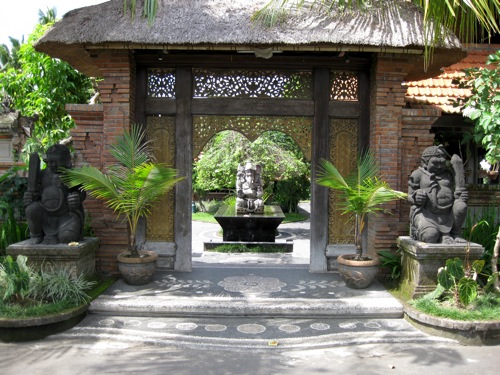

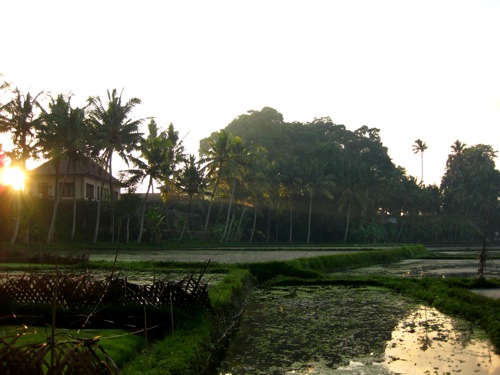
After breakfast we walked to Pasar Ubud (market) on the corner of Monkey Forest Road and Jalan Raya Ubud. For sale were tons of wood carvings and masks, paintings, little trinkets, jewelry, clothing, bags, shoes, and penis bottle openers? I bought a purse for $3 after some haggling down from 75,000rp.
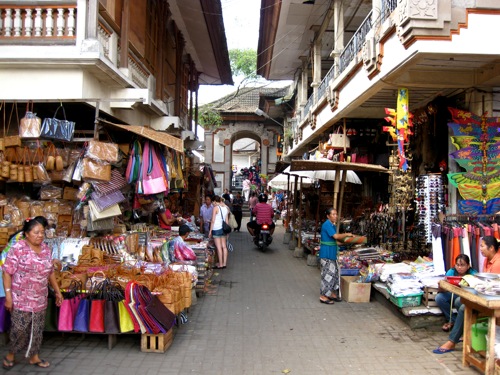
There are little offerings all over the street and anywhere there is enough space to place one. They are on statues, restaurant menus, entryways, sidewalks, etc, and it’s hard to not step on them accidentally.
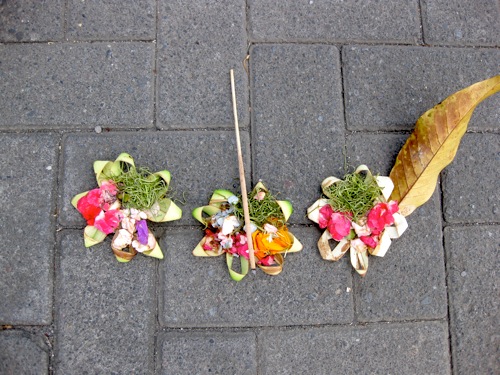
There are amazing temples everywhere, we need to buy sarongs so we can go in. Everyone is required to wear a sarong to enter the temples, including men.
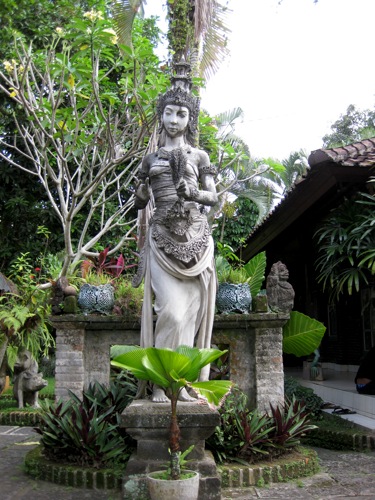
We didn’t get hassled too much while walking, just lots of guys offering you a taxi ride and when you say no they reply with ‘ok, how about tomorrow??’
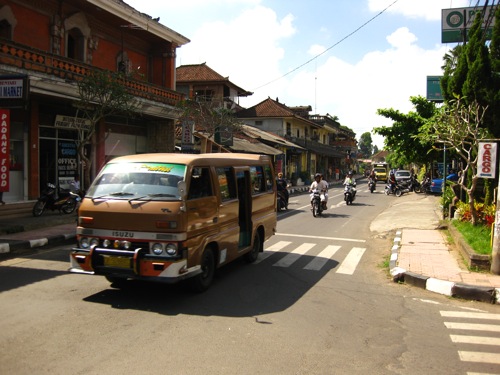
On the way back to Artini 3 we went to an internet cafe and wrote emails. It cost 10,000/hr but we found a cheaper place for 6,000/hr down the road when we continued on. It was very hot so we returned to Artini 3 and lounged in the pool for a few hours.
The hotel staff are very sweet and kind to us, they call us ‘my friend’ and always ask where we are going when we leave and if we enjoyed ourselves when we come back.
Later in the afternoon we went out walking again and got lunch at Kafe Suri. I got a really tasty huge plate of Nasi Campur for 30,000. Ryan got pad thai for same price but mine was yummier.
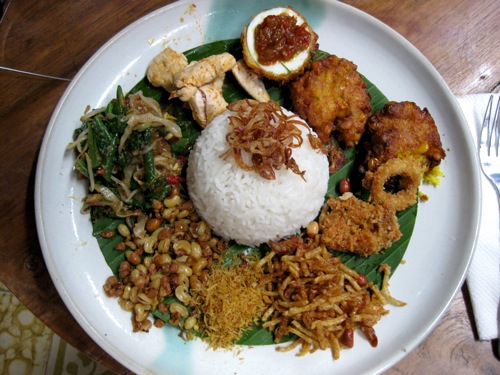
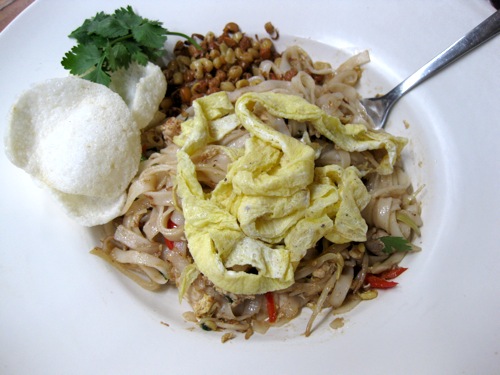
There are stray dogs and cats all over the city. Lots are mangy looking but some are very cute. You don’t want to pet them though, they aren’t friendly and grow at you if you get too close.
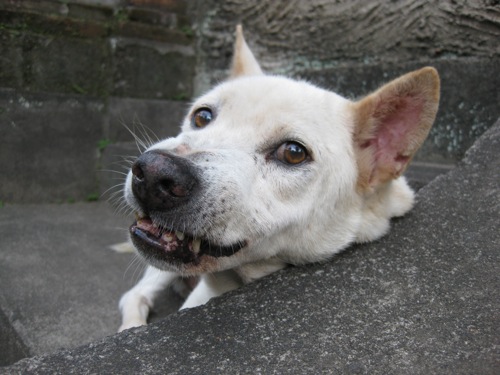
We crashed at 7:30pm and it had already been dark for an hour. It was a very good day, I love it here so far!
